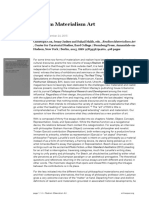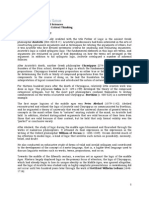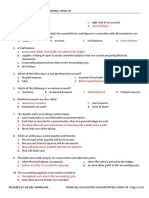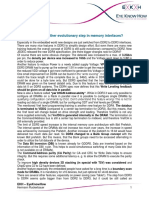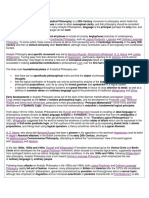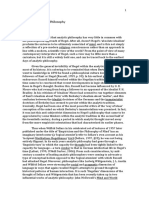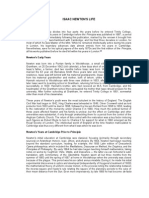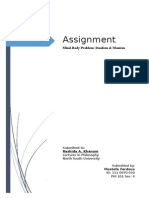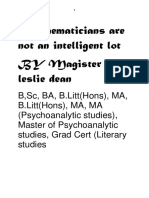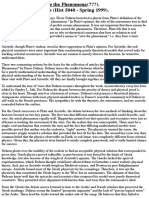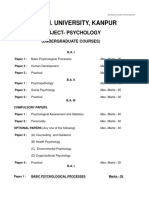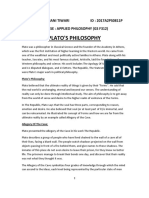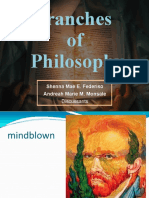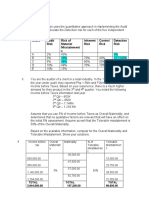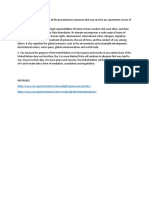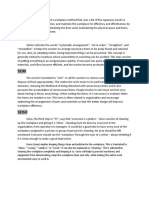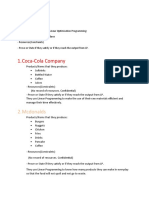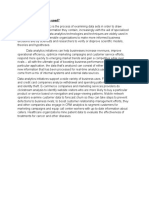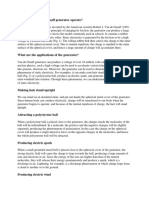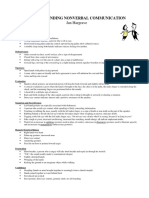Professional Documents
Culture Documents
5 Philosophers That Are Also Mathematicians: Pythagoras, (Born C. 570 BCE, Samos, Ionia (Greece) - Died C. 500
5 Philosophers That Are Also Mathematicians: Pythagoras, (Born C. 570 BCE, Samos, Ionia (Greece) - Died C. 500
Uploaded by
Shaimer CintoOriginal Description:
Original Title
Copyright
Available Formats
Share this document
Did you find this document useful?
Is this content inappropriate?
Report this DocumentCopyright:
Available Formats
5 Philosophers That Are Also Mathematicians: Pythagoras, (Born C. 570 BCE, Samos, Ionia (Greece) - Died C. 500
5 Philosophers That Are Also Mathematicians: Pythagoras, (Born C. 570 BCE, Samos, Ionia (Greece) - Died C. 500
Uploaded by
Shaimer CintoCopyright:
Available Formats
5 Philosophers that are also
mathematicians
Pythagoras, (born c. 570 BCE, Samos, Ionia [Greece]—died c. 500–
490 BCE, Metapontum, Lucanium [Italy]), Greek philosopher, mathematician, and
founder of the Pythagorean brotherhood that, although religious in nature,
formulated principles that influenced the thought of Plato and Aristotle and
contributed to the development of mathematics and Western rational philosophy.
(For a fuller treatment of Pythagoras and Pythagorean thought, seePythagoreanism).
Gottfried Wilhelm Leibniz (b. 1646, d. 1716) was a German philosopher,
mathematician, and logician who is probably most well known for having
invented the differential and integral calculus (independently of Sir Isaac
Newton). In his correspondence with the leading intellectual and political figures
of his era, he discussed mathematics, logic, science, history, law, and theology.
Principal Works:
De Arte Combinatoria (‘On the Art of Combination’), 1666
Hypothesis Physica Nova (‘New Physical Hypothesis’), 1671
Discours de métaphysique (‘Discourse on Metphysics’), 1686
unpublished manuscripts on the calculus of concepts, c. 1690
Nouveaux Essais sur L'entendement humaine (‘New Essays on Human Understanding’),
1705
Théodicée (‘Theodicy’), 1710
Monadologia (‘The Monadology’), 1714
Alfred North Whitehead (1861–1947) was a British mathematician and
philosopher best known for his work in mathematical logic and the
philosophy of science. In collaboration with Bertrand Russell, he co-
authored the landmark three-volume Principia Mathematica (1910, 1912,
1913). Later, he was instrumental in pioneering the approach to
metaphysics now known as process philosophy.
Although there are important continuities throughout his career,
Whitehead’s intellectual life is often divided into three main periods. The
first corresponds roughly to his time at Cambridge from 1884 to 1910. It was during these years
that he worked primarily on issues in mathematics and logic. It was also during this time that he
collaborated with Russell. The second main period, from 1910 to 1924, corresponds roughly to
his time at London. During these years Whitehead concentrated mainly on issues in physics, the
philosophy of science, and the philosophy of education. The third main period corresponds
roughly to his time at Harvard from 1924 onward. It was during this time that he worked
primarily on issues in metaphysics.
René Descartes, (born March 31, 1596, La Haye, Touraine, France—died
February 11, 1650, Stockholm, Sweden), French mathematician, scientist,
and philosopher. Because he was one of the first to abandon scholastic
Aristotelianism, because he formulated the first modern version of mind-
body dualism, from which stems the mind-body problem, and because he
promoted the development of a new science grounded in observation and
experiment, he has been called the father of modern philosophy. Applying
an original system of methodical doubt, he dismissed apparent knowledge
derived from authority, the senses, and reason and erected new epistemic foundations on the
basis of the intuition that, when he is thinking, he exists; this he expressed in the dictum “I think,
therefore I am” (best known in its Latin formulation, “Cogito, ergo sum,” though originally
written in French, “Je pense, donc je suis”). He developed a metaphysical dualism that
distinguishes radically between mind, the essence of which is thinking, and matter, the essence
of which is extension in three dimensions. Descartes’s metaphysics is rationalist, based on the
postulation of innate ideas of mind, matter, and God, but his physics and physiology, based on
sensory experience, are mechanistic and empiricist.
Gottlob Frege was a German logician, mathematician and philosopher who
played a crucial role in the emergence of modern logic and analytic philosophy.
Frege's logical works were revolutionary, and are often taken to represent the
fundamental break between contemporary approaches and the older,
Aristotelian tradition. He invented modern quantificational logic, and created
the first fully axiomatic system for logic, which was complete in its treatment
of propositional and first-order logic, and also represented the first treatment of
higher-order logic. In the philosophy of mathematics, he was one of the most ardent proponents
of logicism, the thesis that mathematical truths are logical truths, and presented influential
criticisms of rival views such as psychologism and formalism. His theory of meaning, especially
his distinction between the sense and reference of linguistic expressions, was groundbreaking in
semantics and the philosophy of language. He had a profound and direct influence on such
thinkers as Russell, Carnap and Wittgenstein. Frege is often called the founder of modern logic,
and he is sometimes even heralded as the founder of analytic philosophy.
REFERENCE
Britannica (2019) Pythagoras: Greek Philosopher and Mathematician
https://www.britannica.com/biography/Pythagoras
Douglas Burnham (2002) Gottfried Leibniz: Metaphysics
https://mally.stanford.edu/leibniz.html
Judith A. Jones (2018) Alfred North Whitehead
https://www.philosophybasics.com/philosophers_whitehead.html
Kevin C. Klement (2002) Gottlob Frege
https://www.iep.utm.edu/frege/
Richard A. Watson (2019) Rene Descartes: French Mathematician and Philosopher
https://www.britannica.com/biography/Rene-Descartes
You might also like
- An Introduction To Moral Philosophy With CasesDocument379 pagesAn Introduction To Moral Philosophy With CasesBüşra GençNo ratings yet
- Fresh Start - The New You Begins - Joel OsteenDocument314 pagesFresh Start - The New You Begins - Joel OsteenKároly Horváth100% (1)
- Philosophical Thoughts On EducationDocument31 pagesPhilosophical Thoughts On EducationRyan Marvin Colanag80% (5)
- PreSocratic Greek PhilosophyDocument25 pagesPreSocratic Greek PhilosophyAngelo Shaun Franklin0% (1)
- Realism Materialism ArtDocument4 pagesRealism Materialism ArtpapiroparoraroNo ratings yet
- PhilosophyDocument137 pagesPhilosophyTraian Gherman95% (21)
- Brief History in LogicDocument2 pagesBrief History in LogicpanchojrNo ratings yet
- Wrap Up Part 2 - Financial Accounting and ReportingDocument14 pagesWrap Up Part 2 - Financial Accounting and ReportingShaimer Cinto100% (1)
- Per DRAM Addressability in DDR4Document2 pagesPer DRAM Addressability in DDR4foreverythingelseNo ratings yet
- Bomba Serie 42 SauerDocument190 pagesBomba Serie 42 SauerOscar Navarro100% (2)
- Analytic PhilosophyDocument2 pagesAnalytic Philosophymira01No ratings yet
- Philosophical Methodology: The Ohio State UniversityDocument4 pagesPhilosophical Methodology: The Ohio State Universityscharp_1100% (2)
- Idealism Abstract: Idealism Is A Term With Several Related Meanings. It Comes ViaDocument4 pagesIdealism Abstract: Idealism Is A Term With Several Related Meanings. It Comes ViaShahid Ali LodhiNo ratings yet
- Outline of Philosophy - WikipediaDocument43 pagesOutline of Philosophy - Wikipediaaditya0001250% (2)
- Hegel and Analytic PhilosophyDocument9 pagesHegel and Analytic PhilosophyElis SimsonNo ratings yet
- Concept and Nature of SelfDocument6 pagesConcept and Nature of SelfMariaMessiah FutotanaNo ratings yet
- 93872s12 Recommended Readings PDFDocument9 pages93872s12 Recommended Readings PDFsmartjohnsmith10No ratings yet
- NewtonDocument5 pagesNewtonqwertyuioy123654No ratings yet
- Menin B. Fundamental Constants. Evaluating Measurement Uncertainty 2019Document124 pagesMenin B. Fundamental Constants. Evaluating Measurement Uncertainty 2019AmejzingŠaciNo ratings yet
- Kant, Immanuel - Aesthetics - Internet Encyclopedia of PhilosophyDocument7 pagesKant, Immanuel - Aesthetics - Internet Encyclopedia of PhilosophyNazir100% (1)
- Thought ExperimentsDocument28 pagesThought ExperimentsulyssespoaNo ratings yet
- Mind-Body ProblemDocument4 pagesMind-Body Problemapi-435009216100% (2)
- Nagarjuna and Quantum PhysicsDocument3 pagesNagarjuna and Quantum Physicsshenzo_100% (1)
- Ancient MaterialismDocument4 pagesAncient MaterialismUzzi LeviNo ratings yet
- Objections To Descartes' DualismDocument10 pagesObjections To Descartes' DualismAbhineet KumarNo ratings yet
- Book Review Epistemology After Protagoras: Responses To Relativism in Plato, Aristotle and DemocritusDocument3 pagesBook Review Epistemology After Protagoras: Responses To Relativism in Plato, Aristotle and Democrituscaribdis66No ratings yet
- Assignment On Mind-Body ProblemDocument5 pagesAssignment On Mind-Body ProblemFerdous MostofaNo ratings yet
- O9a Debunking ChaosDocument8 pagesO9a Debunking ChaosAtazothnashaasNo ratings yet
- I Think Therefore I AmDocument5 pagesI Think Therefore I AmAditi SinghNo ratings yet
- Fine Tuned UniverseDocument36 pagesFine Tuned Universeiryll78e2100% (3)
- Everyday Anarchy PocketbookDocument143 pagesEveryday Anarchy PocketbookVortexNo ratings yet
- Repeated Questions of PhilosophyDocument7 pagesRepeated Questions of PhilosophyAftab HashmiNo ratings yet
- The Universe Is Made of MathematicsDocument2 pagesThe Universe Is Made of MathematicsJosé Augusto Siles Ramírez100% (1)
- Mathematicians Are Not An Intelligent Lot-Epistemology Logic Mathematics Philosophy FoundationsDocument10 pagesMathematicians Are Not An Intelligent Lot-Epistemology Logic Mathematics Philosophy FoundationsgamahucherNo ratings yet
- Philosophy of Nature II (Cosmology)Document15 pagesPhilosophy of Nature II (Cosmology)ThomisticPhilosophy100% (1)
- To Save The PhenomenaDocument3 pagesTo Save The PhenomenamarkokokoNo ratings yet
- Methodology (How To Study Philosophy)Document22 pagesMethodology (How To Study Philosophy)ThomisticPhilosophy100% (2)
- The Strangeloop, Metaphysical Models and RealityDocument2 pagesThe Strangeloop, Metaphysical Models and RealityRadu AnghelNo ratings yet
- Limnatis-The Dimensions of Hegel - S Dialectic (Continuum Studies in Philosophy) (2010)Document287 pagesLimnatis-The Dimensions of Hegel - S Dialectic (Continuum Studies in Philosophy) (2010)Hugo Figueredo100% (1)
- Doing PhilosophyDocument193 pagesDoing Philosophyglamroxx100% (2)
- Being and Non Being Are in OnenessDocument8 pagesBeing and Non Being Are in OnenessRudy BauerNo ratings yet
- Post NihilismDocument4 pagesPost NihilismLamar GabrielNo ratings yet
- Physics and Philosophy-HeisenbergDocument36 pagesPhysics and Philosophy-HeisenbergDanica NovakovićNo ratings yet
- Psych Case StudyDocument15 pagesPsych Case Studyapi-5468856390% (1)
- Roots of Psychology: Ancient Greek EraDocument2 pagesRoots of Psychology: Ancient Greek Eraمہر علی حیدرNo ratings yet
- Quantum Yoga - A View Through The Visionary WindowDocument5 pagesQuantum Yoga - A View Through The Visionary Windowbde_gnas50% (2)
- Immanuel Kant: Espela, Jochen Karl C. CA1A2 - 2 Apan, Carl Jhon Paul MDocument7 pagesImmanuel Kant: Espela, Jochen Karl C. CA1A2 - 2 Apan, Carl Jhon Paul MYohenyoNo ratings yet
- BA PsychologyDocument18 pagesBA PsychologyNitin KordeNo ratings yet
- Introduction To BuddhismDocument37 pagesIntroduction To BuddhismIdris Satter100% (1)
- Kinds of PoetryDocument4 pagesKinds of Poetrytracyrick1No ratings yet
- Plato's PhilosophyDocument4 pagesPlato's PhilosophyHarshNo ratings yet
- Branches of Philosophy: Shenna Mae E. Federiso Andreah Marie M. MonsaleDocument130 pagesBranches of Philosophy: Shenna Mae E. Federiso Andreah Marie M. Monsaleella mayNo ratings yet
- Scientific Reality Is TextualDocument27 pagesScientific Reality Is Textualgamahucher100% (1)
- Phil 102 Descartes 2Document29 pagesPhil 102 Descartes 2rhye999No ratings yet
- SocratesDocument196 pagesSocratesdakunerr100% (12)
- History of LogicDocument1 pageHistory of LogicLorelyn AbellanaNo ratings yet
- Alexander Spirkin - Fundamentals of PhilosophyDocument425 pagesAlexander Spirkin - Fundamentals of PhilosophySalam Aleykum100% (19)
- Colegio de San Juan de LetranDocument2 pagesColegio de San Juan de LetranpanchojrNo ratings yet
- St. Augustine: SocratesDocument4 pagesSt. Augustine: SocratesAngela HabaradasNo ratings yet
- Philosophy-Term-Paper - ArselDocument15 pagesPhilosophy-Term-Paper - ArselShaira MejaresNo ratings yet
- Famous For: Famous For:: Karl Marx (1818-1883) Voltaire (1694-1778)Document10 pagesFamous For: Famous For:: Karl Marx (1818-1883) Voltaire (1694-1778)Jerome Cailo DiazNo ratings yet
- The Scientific Revolution at Its Zenith 1620 1720Document13 pagesThe Scientific Revolution at Its Zenith 1620 1720illumin24No ratings yet
- Zeno of Elea: Philosophic Naturalism Principia Mathematical (Usually Called The Principia) Is Considered ToDocument4 pagesZeno of Elea: Philosophic Naturalism Principia Mathematical (Usually Called The Principia) Is Considered ToVijay PeriyasamyNo ratings yet
- Comparative AnalysisDocument4 pagesComparative AnalysisShaimer CintoNo ratings yet
- Cinto - Case AnalysisDocument4 pagesCinto - Case AnalysisShaimer CintoNo ratings yet
- AISDocument4 pagesAISShaimer Cinto100% (1)
- International Law Defines The Legal Responsibilities of States in Their Conduct With Each Other, and TheirDocument1 pageInternational Law Defines The Legal Responsibilities of States in Their Conduct With Each Other, and TheirShaimer CintoNo ratings yet
- Affidavit of Support and ConsentDocument1 pageAffidavit of Support and ConsentShaimer CintoNo ratings yet
- SeitonDocument3 pagesSeitonShaimer CintoNo ratings yet
- CaseStudy Cinto ShaimerDocument2 pagesCaseStudy Cinto ShaimerShaimer CintoNo ratings yet
- 5-Sales and Collection Business ProcessDocument24 pages5-Sales and Collection Business ProcessShaimer CintoNo ratings yet
- Cinto, Shaimer AssignmentDocument1 pageCinto, Shaimer AssignmentShaimer CintoNo ratings yet
- Self-Esteem: Name: ID No.: SectionDocument3 pagesSelf-Esteem: Name: ID No.: SectionShaimer CintoNo ratings yet
- Tobias, Jade C. Bsme 3A: Assignment # 5Document10 pagesTobias, Jade C. Bsme 3A: Assignment # 5Jade Tobias100% (1)
- 20 GENERIC IEE Checklist FormDocument14 pages20 GENERIC IEE Checklist FormPaolo Cobrado100% (1)
- Non-Destructive Testing (NDT) - Methodology CAPO TEST (Cut & Pull Out)Document6 pagesNon-Destructive Testing (NDT) - Methodology CAPO TEST (Cut & Pull Out)Krishna UmbareNo ratings yet
- A GUIDE TO ROCK CORE LOGGING Part 1Document19 pagesA GUIDE TO ROCK CORE LOGGING Part 1CocoNo ratings yet
- A Nomogram For Calculation of Aerobic Capacity (Physical Fitness) From Pulse Rate During Submaximal WorkDocument4 pagesA Nomogram For Calculation of Aerobic Capacity (Physical Fitness) From Pulse Rate During Submaximal WorkEstebanNo ratings yet
- Purnomo Suryohudoyo: Dept. of Biochemistry School of Medicine Airlangga UniversityDocument32 pagesPurnomo Suryohudoyo: Dept. of Biochemistry School of Medicine Airlangga UniversityAlif FakhrurroziNo ratings yet
- Páginas desde70180-00-CW - YDA-TRE-001Document1 pagePáginas desde70180-00-CW - YDA-TRE-001Leonel Perez RubioNo ratings yet
- Low-Cost One-Chip Multi-Effects DSP V1000: 1. General DescriptionDocument13 pagesLow-Cost One-Chip Multi-Effects DSP V1000: 1. General DescriptionHermanherdiantoNo ratings yet
- Islam PDFDocument2 pagesIslam PDFFaisNo ratings yet
- Resilient Shipping Container Shelter: A Project Housing Design For Immediate Evacuation During Cataclysmic EventDocument5 pagesResilient Shipping Container Shelter: A Project Housing Design For Immediate Evacuation During Cataclysmic EventSAMUEL BULALACAONo ratings yet
- SX Maths (1804)Document1 pageSX Maths (1804)Anup GandhiNo ratings yet
- Atys CatalogueDocument31 pagesAtys CatalogueepicenterrulezNo ratings yet
- Efficient Removal of Polymerization Inhibitors by Adsorption On The Surface of An Optimized AluminaDocument5 pagesEfficient Removal of Polymerization Inhibitors by Adsorption On The Surface of An Optimized Alumina꽃개No ratings yet
- Task 2 Choosing The Right VisualsDocument3 pagesTask 2 Choosing The Right VisualsTim CookNo ratings yet
- 60 - Sensor TriggerDocument9 pages60 - Sensor TriggerP SmithNo ratings yet
- Webster User's ManualDocument7 pagesWebster User's ManualAngel Alvarez CarrilloNo ratings yet
- How Does A Van de Graaff Generator OperateDocument8 pagesHow Does A Van de Graaff Generator OperateTimberlyNo ratings yet
- Mechanical CPR Assist DeviceDocument8 pagesMechanical CPR Assist DeviceForum PompieriiNo ratings yet
- Eg Unit 4 QPDocument3 pagesEg Unit 4 QPMICHEL RAJ MechNo ratings yet
- User Manual: STM32 Nucleo-144 Boards (MB1137)Document85 pagesUser Manual: STM32 Nucleo-144 Boards (MB1137)Omri AssafNo ratings yet
- Reading Body Language HandoutDocument2 pagesReading Body Language HandoutNicoleAnn CuldoraNo ratings yet
- SSFM - Amul - FinalDocument17 pagesSSFM - Amul - FinalBishal SahaNo ratings yet
- OTW - Opis Procese Verbale Mai 2016Document2 pagesOTW - Opis Procese Verbale Mai 2016Cristina AndronescuNo ratings yet
- Physics NotesDocument48 pagesPhysics NotesAshley LimNo ratings yet
- Sensory Analysis of Pet FoodsDocument26 pagesSensory Analysis of Pet FoodsLaisNo ratings yet
- Heat Exchanger Selection GuideDocument2 pagesHeat Exchanger Selection GuiderodrigoperezsimoneNo ratings yet




